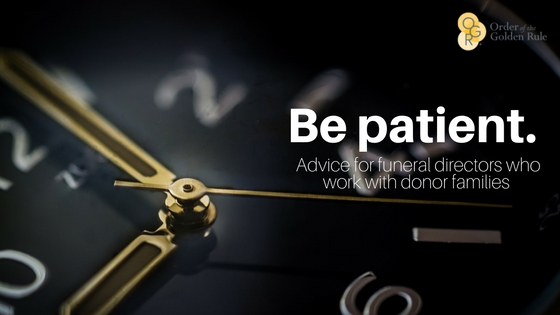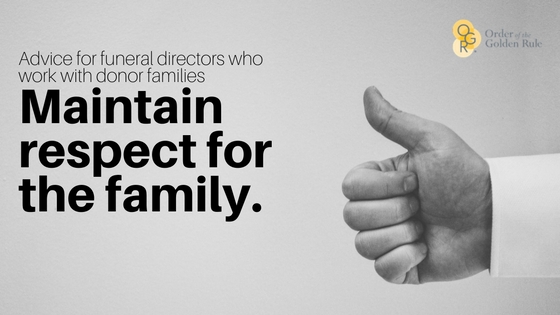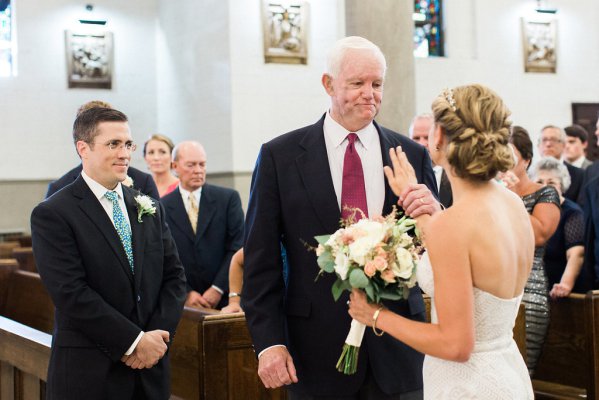Advice for Funeral Directors Working with Donor Families
Guest article provided by: Order of the Golden Rule – OGR
Jeni Stepien’s father was murdered ten years ago, but his heart lives on in the body of donor recipient Arthur Thomas. When Ms. Stepien got engaged in October, 2015, she struggled with deciding who would walk her down the aisle. The thought that a piece of her father could be present during her wedding ceremony led her to ask Arthur if he’d be willing to escort her. Mr. Thomas agreed, and after he walked her down the aisle on Friday, Jeni shared “My dad is here with us, and this man is here because of us.”
Such a beautiful story has us wondering what role the funeral director played in the Stepien and Thomas story. How can funeral service professionals serve families like the Stepiens? Funeral directors are well-positioned to provide donor families with the support and information they need and make a powerful impact in each family’s life, but is there anything they can do specifically?
 Jack Attfield of OGR member firm Lakeside Memorial Funeral Home in Hamburg, NY can offer valuable insight into this topic. He currently works as a funeral director at Lakeside and also serves on the Funeral Directors Advisory Board of his local organ procurement organization (OPO). Jack also spent six years working for an organ donation facility, so he has had the unique opportunity to observe multiple perspectives of the donation issue.
Jack Attfield of OGR member firm Lakeside Memorial Funeral Home in Hamburg, NY can offer valuable insight into this topic. He currently works as a funeral director at Lakeside and also serves on the Funeral Directors Advisory Board of his local organ procurement organization (OPO). Jack also spent six years working for an organ donation facility, so he has had the unique opportunity to observe multiple perspectives of the donation issue.
Here are a few tips offered by Jack Attfield on how funeral directors can better care for a donor family:

- Provide accurate information. Donor families will have questions and may not necessarily know where to go for answers, especially if the deceased was not a designated donor. Funeral directors understand the donation process, but many donor families, especially those experiencing the sudden loss of a loved one, do not. Mr. Attfield proposes, “One of the most important roles of the funeral director in the donation process is to educate and provide the family accurate information.” Having the right information at a time when a family is experiencing a wide range of emotions and may abruptly change their mind is critical to their donation decision.

- Be patient. Funeral directors can support the family through the organ donation process by remembering they are there to serve the needs of the family according to their schedule, not the funeral home’s. Some funeral directors tend to be a bit impatient with donor families, which Jack says is a common complaint in his area. For organ donation, “the procurement may not take place for 24 hours or more because recipients must be found. If the organ donor is also donating tissue, that can extend the time frame another 12 hours, so someone may be on hold for 36 hours.” In these cases, for example, funeral directors should adjust their schedules to meet the requests of the donor family.

- Maintain respect for the family. Donors and their families have chosen to give the ultimate gift without anything in return, and funeral directors play a key role in making this sacrifice a reality. Funeral service professionals should respect the family and the deceased’s wishes and recognize that this process can help them cope with loss. The gift of donation can emotionally benefit donor families in their time of grief, or in years to come as was the case with Jeni Stepien, because it serves as an affirmation of the generosity and selflessness of their loved one. The funeral director plays a key role in bringing this about.
The gift of donation is the ultimate humanitarian act. While there are many misconceptions about donation, the myths can be dispelled through better education and public outreach. All parties involved in the donation process, including OPOs, transplantation coordinators, medical institutions, and funeral homes, should be committed to increasing awareness regarding donation. As one of the last stops for a grieving family, funeral directors have the honor of educating, providing exemplary service to donor families, and possibly being part of a story like Jeni Stepien’s.




